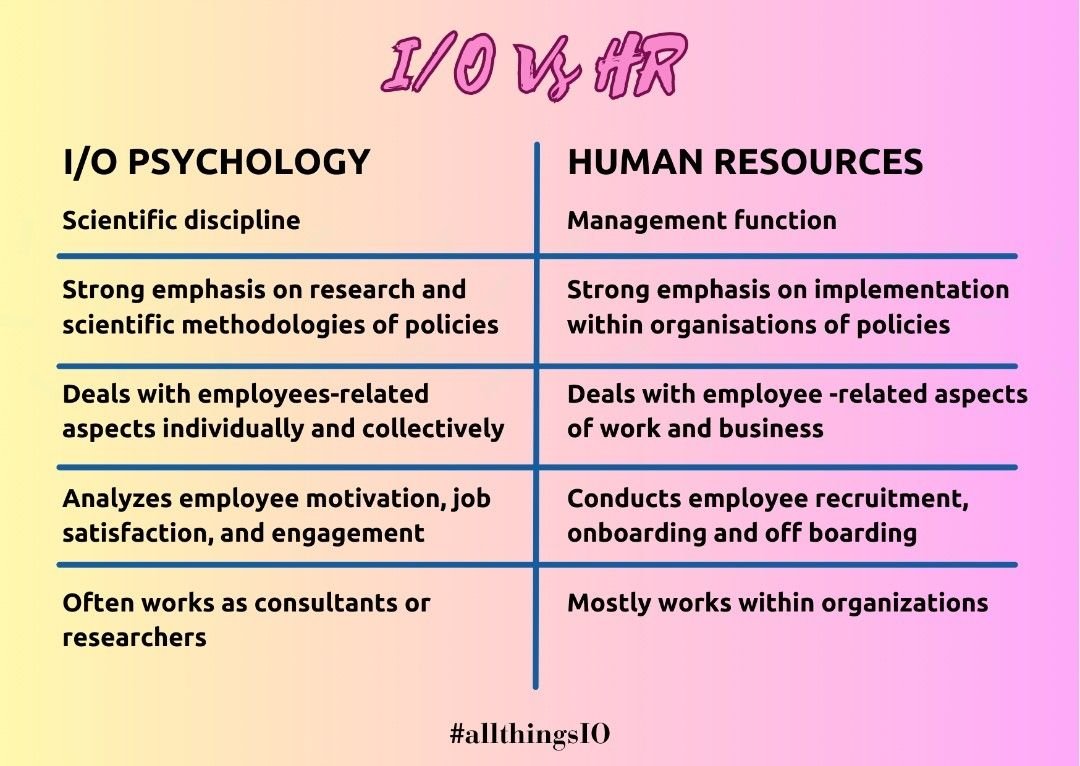I/O Psych & Cultural change
Navigating Work Culture Transformation with I/O Psychology
Industrial/Organizational Psychology, commonly known as I/O Psychology, is a dynamic and rapidly growing field that plays a pivotal role in addressing workplace issues at both the individual and organizational levels. The Society for Industrial and Organizational Psychology defines I-O psychology as a discipline that applies research to enhance the well-being and performance of people and the organizations they work for. This blog post will delve into what I/O Psychology entails, its two major sides (Industrial and Organizational Psychology), key subject areas, and its relevance to culture transformation.
Understanding Industrial and Organizational Psychology
I/O Psychology encompasses two major sides: Industrial Psychology (also referred to as personnel psychology) and Organizational Psychology.
1. Industrial Psychology: This facet of I/O Psychology focuses on the individual within the workplace. It deals with matching individuals to specific job roles, assessing employee characteristics, and ensuring employees are placed in roles where they are most likely to excel. Industrial psychologists also train, coach, develop job performance standards, and measure job performance.
2. Organizational Psychology: Organizational Psychology is concerned with understanding how organizations influence individual behavior. It examines factors such as organizational structures, social norms, management styles, and role expectations that shape behavior within an organization. The aim is to improve individual performance and health while simultaneously benefiting the organization as a whole.
Topics in Industrial / Organizational Psychology
Within these subject areas, there are several topics that I/O psychologists study and apply:
- Leadership: Understanding effective leadership styles and strategies to improve organizational outcomes.
- Employee Motivation: Exploring factors that drive employee engagement and productivity.
- Coaching (Executive & Career Coaching): Providing guidance and mentorship to individuals to help them reach their full potential.
- AI and Innovation: Harnessing technology and innovation for organizational growth.
- Product Design: Designing products and services that align with both employee and customer needs.
- Workplace Performance: Analyzing and optimizing workplace performance through various strategies.
- Human Capital Management: Maximizing the value of human resources within an organization.
- HR and I/O Psychology: Collaborating with HR departments to implement I/O principles effectively.
“ I-O psychology is a discipline that applies research to enhance the well-being and performance of people and the organizations they work for.”
Key Subject Areas in Industrial / Organizational Psychology
To comprehend the vast scope of I/O Psychology, let's explore some key subject areas within the field:
- Organizational Development: This area focuses on assessing and enhancing the current state of an organization's culture and structure. It plays a crucial role in driving culture transformation efforts.
- Employee Selection: I/O psychologists are experts in designing and implementing selection processes to ensure the right people are hired for the right roles.
- Change Management: I/O psychologists help organizations navigate change, mitigate resistance, and ensure successful transitions.
- Ergonomics: This field addresses the design of workspaces and tasks to optimize employee performance and well-being.
- Talent Management: Talent management attracts, retains, and develops top talent.
- Diversity, Equity, and Inclusion: Promoting diversity and inclusion is a key focus in I/O Psychology, ensuring that all workplaces are equitable and welcoming.
- Performance Management: I/O psychologists design systems to evaluate and enhance employee performance.
- Training and Development: They create effective training programs to upskill employees and improve overall performance.
- Work-Life Balance: This area addresses the delicate balance between work and personal life, striving to create a harmonious environment for employees.
“I/O psychologists are akin to building inspectors who diagnose systemic issues and conduct research to understand how workplace policies affect outcomes. In contrast, HR managers are more like contractors who implement policies, handle employee relations, and manage day-to-day HR functions.”
Comparing I/O Psychology and HR
While both I/O Psychology and Human Resources (HR) focus on the human side of work, they have distinct organizational roles and functions.
Similarities: Both disciplines measure an organization's individual needs, motivations, and abilities. They are also interested in improving the quality of life at work and overall productivity.
Differences: I/O psychologists are akin to inspectors who diagnose systemic issues and conduct research to understand how workplace policies affect outcomes. In contrast, HR managers are more like contractors who implement policies, handle employee relations, and manage day-to-day HR functions.
The differences between I/O Psychology and Human Resources. Source: Naomi Morgan, PHR
I/O Psychology and Culture Transformation
Now, let's explore how I/O Psychology contributes to cultural transformation:
1. Organizational Development: I/O psychologists play a vital role in assessing the current organizational culture and designing strategies to transform it. They work closely with leaders to align culture with the organization's goals and values.
2. Diversity, Equity, and Inclusion (DEI): DEI initiatives are integral to culture transformation efforts. I/O psychologists drive these initiatives by promoting a sense of belonging for all employees, fostering an inclusive environment, and addressing bias and discrimination.
3. Behavioral Assessment: I/O psychologists assess human behavior within the workplace and help employees navigate change and overcome resistance. This is crucial for cultural transformation, as resistance to change is a common barrier.
“I/O Psychology is a dynamic and multifaceted field that is pivotal in shaping workplaces and driving culture transformation. By understanding human behavior, conducting research, and applying psychological principles, I/O psychologists help organizations create environments where employees thrive, leaders excel, and culture is transformed”
Career Paths in I/O Psychology and Supporting Culture Transformation
For those interested in I/O Psychology and culture transformation work, various career paths are available:
- Organizational Development: Focusing on improving organizational effectiveness and culture.
- Talent Management: Attracting, developing, and retaining top talent to drive culture change.
- Change Management: Leading efforts to facilitate smooth transitions during culture transformations.
- People Analytics: Leveraging data and analytics to inform culture transformation strategies.
- Diversity, Equity, and Inclusion: Championing DEI initiatives to create inclusive cultures.
All in all, I/O Psychology is a dynamic and multifaceted field that is pivotal in shaping workplaces and driving culture transformation. By understanding human behavior, conducting research, and applying psychological principles, I/O psychologists help organizations create environments where employees thrive, leaders excel, and culture is transformed. As the future of work continues to evolve, the importance of I/O Psychology in guiding organizations toward positive change and growth cannot be overstated. It is a field that continues to adapt and grow, making it a key player in the evolving work landscape and culture.





